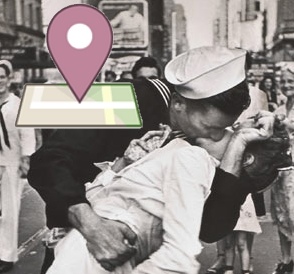Comments weren’t working for a while today. Apologies to anyone whose words got eaten! Should be working again now.
An odd moment during the Facebook Places rollout last week has been bugging me ever since.
From Caroline McCarthy’s account at CNet:
Facebook not only wants to be the digital sovereignty toward which all other geolocation apps direct their figurative roads, it also wants to be the Web’s own omniscient historian.
“Too many of our human stories are still collecting dust on the shelves of our collections at home,” Facebook vice president of product Christopher Cox said as he explained the sociological rationale behind Facebook Places… “Those stories are going to be placed,” Cox said. “Those stories are going to be pinned to a physical location so that maybe one day in 20 years our children will go to Ocean Beach in San Francisco, and their little magical thing will start to vibrate and say, ‘This is where your parents first kissed.'”
From Chris O’Brien’s post:
Cox: “…Technology does not need to estrange us from each other.â€
“Maybe one time you walk into a bar, you sit down at the bar, and you put your magical 10-years-into-the-future phone down. And suddenly it starts to glow. ‘This is what your friend ordered here’. And it pops up these memories…’Go check out this thing about the urinal that your friend wrote about when they were here about eight months ago.’ â€
Cox explained that all these check-ins, photos, and videos could be gathered on pages about a place to create “collective memories.â€
“That’s dope.â€
Yeah, that’s dope all right. Doper still would be for Facebook to begin performing this role of “omniscient historian” or “memory collector” right now. As I’ve been arguing for some time, Neither Facebook nor Twitter is doing a very good job of sharing the history we’re recording on them.
Everything we put on the Web is both ephemeral and archival — ephemeral in the sense that so much of what we post is only fleetingly relevant, archival in the sense that the things we post tend to stay where we put them so we can find them years later. Most forms of social media in the pre-status-update era — blogging, Flickr, Delicious, Youtube and so on — functioned in this manner. They encouraged us to pile up our stuff in public with the promise that it would still be there when we came back. As Marc Hedlund put it: public and permanent.
Twitter, at least, places each Tweet at a “permalink”-style public URL. So if you save a particular Tweet’s address you can find it again in the future. Otherwise, you’re out of luck. (You can make local copies of your Tweetstream, but that’s more of a backup than a linkable public archive.) Presumably Twitter is keeping all this data, and they’ve said that they’re handing a complete record over to the Library of Congress. But the data isn’t public and permanent for the rest of us. I think we’re just supposed to take it on faith that we’ll get the keys back to it eventually. (Jeff Jarvis says he interviewed Evan Williams and “told him I want better ways to save my tweets, making them memory.” Hope to hear more from that. By linking to Jeff’s tweet here I have fished it out for posterity, one needle plucked from the fugitive haystack.)
Meanwhile, Facebook is even less helpful. Lord knows what happens to the old stuff there. Is there any way to find what you wrote on Facebook last year? I hope so, for the sake of the millions of people who are chronicling their lives on Mark Zuckerberg’s servers. But I’ve certainly never been able to find it.
 In fact, Facebook is relentlessly now-focused. And because it uses its own proprietary software that it regularly changes, there is no way to build your own alternate set of archive links to old posts and pages the way you can on the open Web. Facebook users are pouring their hearts and souls into this system and it is tossing them into the proverbial circular file.
In fact, Facebook is relentlessly now-focused. And because it uses its own proprietary software that it regularly changes, there is no way to build your own alternate set of archive links to old posts and pages the way you can on the open Web. Facebook users are pouring their hearts and souls into this system and it is tossing them into the proverbial circular file.
All of which led me to wonder what Facebook could possibly be thinking in asking us to imagine Places as a future repository for our collective history. After all, Facebook could be such a repository today, if it actually cared about history. It has given no evidence of such concern.
Maybe in the future all manner of data will, as Cox put it so charmingly, cause our “little magical things to start to vibrate.” I mean, dope! But if my kids are going to find out about the site of their parents’ first kiss, I’ll have to provide that information to someone. I don’t think it will be Facebook.
Post Revisions:
- August 23, 2010 @ 17:36:38 [Current Revision] by Scott Rosenberg
- August 23, 2010 @ 14:25:07 by Scott Rosenberg
- August 23, 2010 @ 10:56:29 by Scott Rosenberg
- August 23, 2010 @ 06:43:16 by Scott Rosenberg
- August 23, 2010 @ 06:15:43 by Scott Rosenberg
